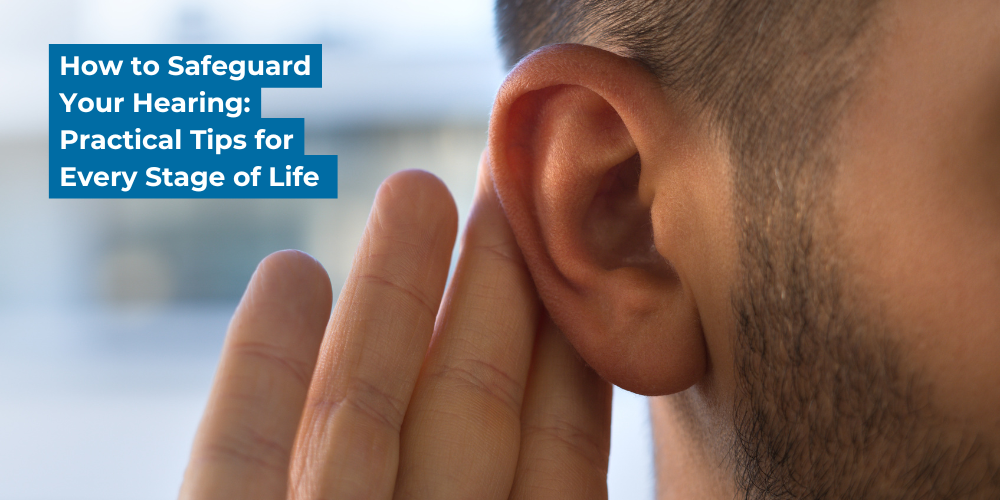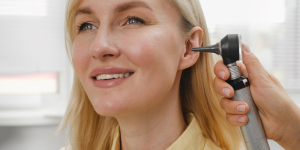Your hearing connects you to the world in ways you might not even realize, from conversations with loved ones to the enjoyment of music and nature. However, hearing loss often develops gradually, and by the time you notice it, irreversible damage may have already occurred. With October being both National Audiology Awareness Month and National Protect Your Hearing Month, now is the perfect time to focus on safeguarding your hearing at every stage of life.
Why is Hearing Protection Important?
Hearing loss affects people of all ages, and according to the World Health Organization, over 1.5 billion people globally live with some form of hearing impairment. In the U.S. alone, approximately 48 million people (about twice the population of Texas) experience hearing loss, according to National Council on Aging. Taking steps to protect your ears today can help preserve your hearing for years to come.
Hearing Tips for Every Age
Infants and Toddlers: Early Detection and Protection
The earliest stages of life are critical for hearing health.
- Hearing screenings: Ensure your baby undergoes newborn hearing screenings. These can help detect any early hearing impairments that might affect speech and language development.
- Avoid loud toys: Limit exposure to toys or devices that produce loud sounds. If it’s too loud for you, it’s likely too loud for their sensitive ears.
Learn more about the different types of hearing loss that can affect children from a young age.
Children and Adolescents: Limiting Noise-Induced Hearing Loss
As children grow, exposure to loud noises becomes a bigger risk.
- Teach headphone safety: Encourage the use of volume-limiting headphones or follow the 60/60 rule: volume at 60% for no more than 60 minutes at a time according to the World Health Organization.
- Promote ear protection: For concerts, sporting events, or even fireworks, equip your child with noise-canceling headphones or earplugs.
Dive deeper into how hearing loss impacts people of all ages and what preventative steps you can take during adolescence.
Adults: Protect Your Ears at Work and Play
From loud work environments to noisy hobbies, adults face numerous risks for hearing damage.
- Wear ear protection at work: If your job involves exposure to loud machinery, music, or equipment, ear protection is essential. Be sure to use high-quality earplugs or earmuffs.
- Schedule routine hearing screenings: Especially if you’re frequently exposed to high noise levels, annual hearing exams can help identify early signs of hearing loss.
Did you know we offer specialized care for hearing evaluation and protection? Visit our Hearing Aids Specialist & Audiologist in Texas page to learn how we can help you protect your hearing.
Seniors: Keep Monitoring Hearing Health
Age-related hearing loss (presbycusis) is common and affects almost half of adults over 75.
- Regular checkups: Annual hearing tests are vital as you age. Early detection can prevent more serious complications.
- Consider hearing aids: Modern hearing aids are discreet and highly effective. They improve your quality of life by keeping you connected and alert to your surroundings.
General Tips for All Ages
No matter your age, these hearing protection tips can help keep your ears healthy:
- Avoid exposure to loud sounds. Prolonged exposure to sounds over 85 decibels (dB) can cause permanent hearing damage.
- Turn down the volume. Whether it’s your headphones or TV, keeping the volume at a lower level can make a big difference in protecting your ears.
- Use hearing protection in noisy environments. Earplugs or noise-canceling headphones are must-haves at concerts, construction sites, or even during a workout at the gym.
How We Can Help Protect Your Hearing
At The ENT and Allergy Centers of Texas, our expert audiologists are dedicated to helping you protect and maintain your hearing health at every stage of life. Whether you’re looking for hearing protection solutions, screenings, or need more information about hearing aids, our team is here for you.
Click here to schedule an appointment and keep in mind that by following these preventative tips you can safeguard your hearing for a lifetime. Protect your ears today and take the first step toward better hearing health!





